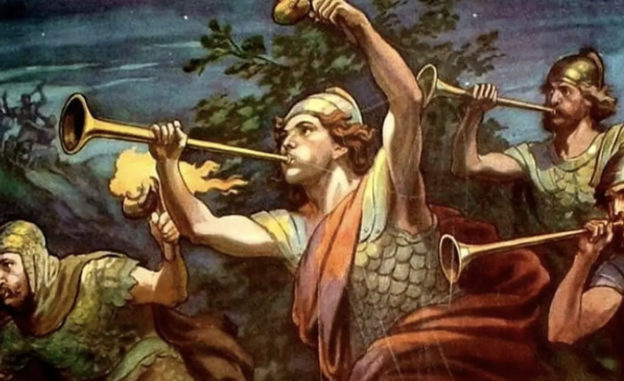The Christian walk can feel like a constant conflict between strength and weakness. Empowered by the Holy Spirit, we step out in faith and trust God’s promises, turning away from sinful patterns of life. Yet at the same time, our faith is still weak and requires reassurance, and our old ways still live within us.
For Gideon, his first steps in faith at following God’s commission to him were successful. But addressing the spiritual problem which caused the oppression of Israel was only the first step. The Midianites were still a problem that required dealing with. For that, God would clothe Gideon with power. Yet despite this, Gideon was still a man of weakness, who like us needed assurance from God.
After Gideon vanquished Baal by chopping down his idolatrous image and escaping punishment from an impotent non-entity, the next step in freeing Israel from bondage began. Gideon still had to deal with the Midianites and their human-locust ways.
The opportunity would not take long to appear. “Now all the Midianites and the Amalekites and the people of the East came together, and they crossed the Jordan and encamped in the Valley of Jezreel” (v.33). The enemy gathered themselves together, crossed into the Promised Land for their annual pillage, and camped in a northern valley of Israel.
Last time, Gideon had hid his wheat in the winepress out of fear. This time, “the Spirit of the LORD clothed Gideon” (v.34). Rather than fear, God clothed Gideon with his Holy Spirit, strengthening and empowering him for the battle ahead.
Gideon, clothed in spiritual power, “sounded the trumpet, and the Abiezrites were called out to follow him” (v.34). He summoned his clan for the fight, and “sent messengers throughout all Manasseh” along with “Asher, Zebulun, and Naphtali, and they went up to meet them” (v.35). Clothed in God’s strength, Gideon assembled the strength of the surrounding tribes to take on their oppressors.
Despite this strength, we still see the same pattern of weakness in Gideon’s life. Gideon needed assurance that God would fulfil his promises. Despite the revelation and commissioning Gideon received. Despite his clothing in the Holy Spirit.
This need for assurance led Gideon to confirm that the steps he was taking were those which God wished. He wanted confirmation that God would save Israel by his hand, “as you have said” (v.36).
To seek this assurance, Gideon laid down a fleece on the the floor of a threshing pit, and asked that as a sign only the fleece have dew on it, “then I shall know that you will save Israel by my hand, as you have said” (v.37).
The issue is not unbelief, but assurance. Gideon is hesitant. He wants assurance that the steps he has taken are those God wishes him to take.
God did not respond with angry shouts demanding obedience, but the response of a parent reassuring a young, hesitant child.
“And it was so” as God answered his request. “When he rose early next morning and squeezed the fleece, he wrung enough dew from the fleece to fill a bowl with water” (v.38).
Yet this request was not enough assurance. Gideon asked for the even more dramatic reverse, where the fleece was dry and the ground damp (v.39). We would expect the fleece to soak up the surrounding damp, even if it did not fall directly on the fleece. This made the request even more profound, since it would violate “natural law”.
While our expectation might be God losing patience, instead “God did so that night; and it was dry on the fleece only, and on all the ground there was dew” (v.40). Gideon’s weakness was assured. God was surely with him to drive out the Midianites.
Asking for this or similar miraculous signs today is not a valid understanding to draw from this passage. But there is a lesson for us. God recognises and is patient with our weaknesses, just as he was with Gideon. Jesus sympathised with our weaknesses in his ministry on earth and continues so now in his intercession at God’s right hand (Hebrews 4:15).
Instead of dew on fleeces (or not), God provides assurance to us through the Holy Spirit, through the Gospel and the Word preached, through Baptism and Communion, and in prayer. In these, God assures us of his pardon and his presence with us, and that he will fulfil his promises.
One of those promises was to fill his people with the Holy Spirit (Joel 2, Acts 2), which is fulfilled today for all believers. Through the Spirit’s work of application, we are clothed with Christ’s righteousness. We are equipped to increasingly fulfil the call to put on the new self, created after the likeness of God (Eph. 4:24); to put on Jesus Christ and make no provision for the flesh (Rom. 13:14).
Through the Holy Spirit clothing us with Christ, we are strengthened even in our weakness to fulfil the mission God has given us, reassured of God’s presence by the means of grace.

